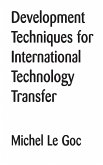Dr. Reddy points out that the key to economic success, particularly for the less developed countries of the world, is technology-but only when properly applied. Despite years of help through technology transfer, however, many LDCs are still improverished. This leads him to conclude that either the wrong technologies were transferred or the right ones were not transfered. His book thus focuses on ways in which LDCs can improve their economic growth through technology transfer, arguing that it is the assimilation of technology into their socioeconomic and cultural structures that is critical to their economic development, not the indiscriminate borrowing from advanced nations. In doing so, Dr. Reddy presents a behavioral model which proves that technology absorption is just as-if not more-important than a simple transfer process. A challenging, research-based discussion for academics in economics, business, sociology, marketing, and management, and for business and government policymakers worldwide. Dr. Reddy introduces the concepts related to technology transfer and discusses the major participants in the worldwide transfer enterprise. He presents barriers and ways to overcome them in technology transferral, explores the ethical dimensions, and then lays out his technology transfer assimilation model. He applies the model to a specific and representative developing country, India, and ends with a discussion of conclusions that can be drawn from it. His three appendixes elaborate on the need for, and methods to, transfer technology to LDCs, provide ways to analyze the costs, and present a model of reciprocal distribution that may benefit both the donor and the recipient country in the transfer process.
Hinweis: Dieser Artikel kann nur an eine deutsche Lieferadresse ausgeliefert werden.
Hinweis: Dieser Artikel kann nur an eine deutsche Lieferadresse ausgeliefert werden.








